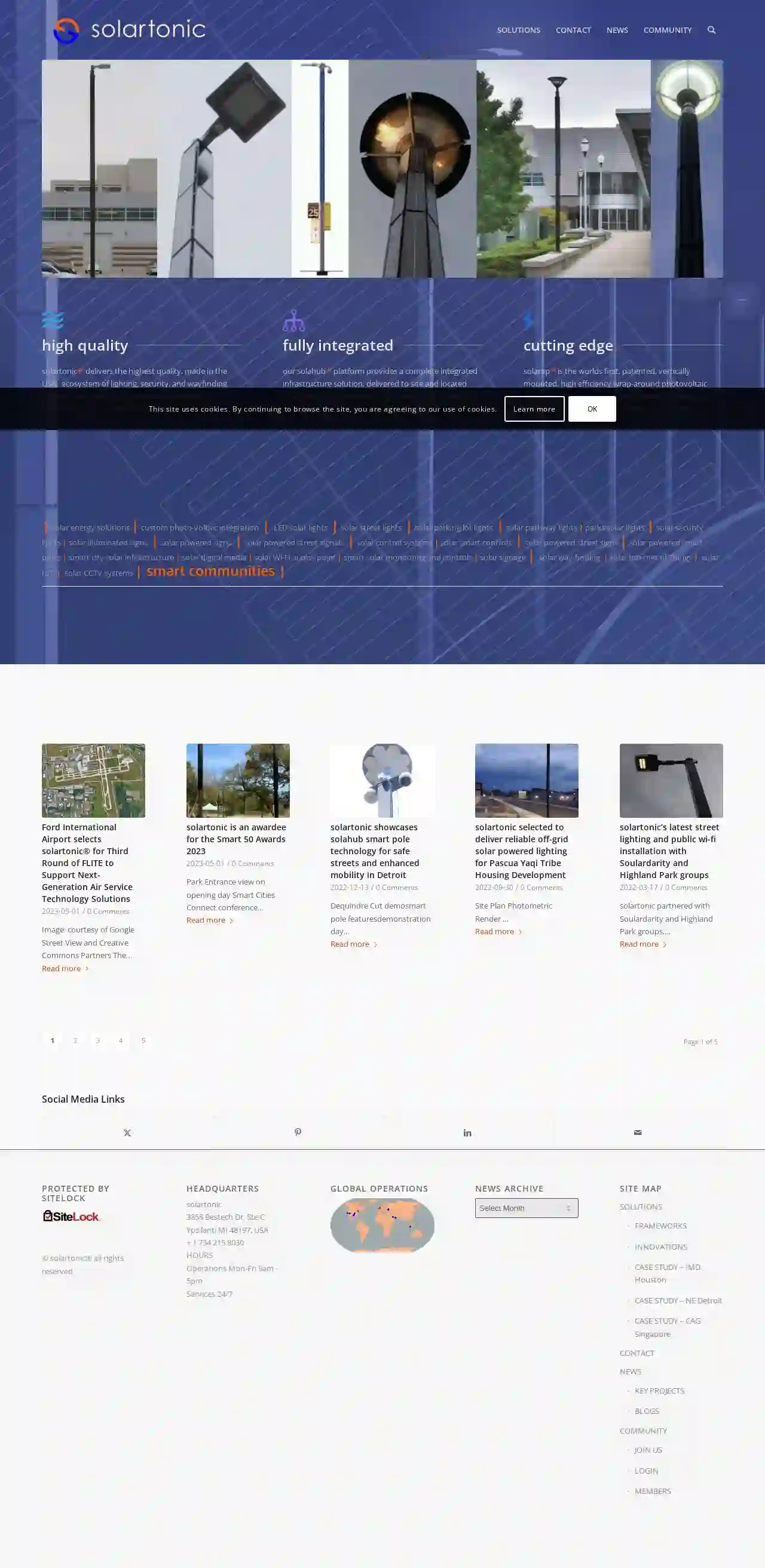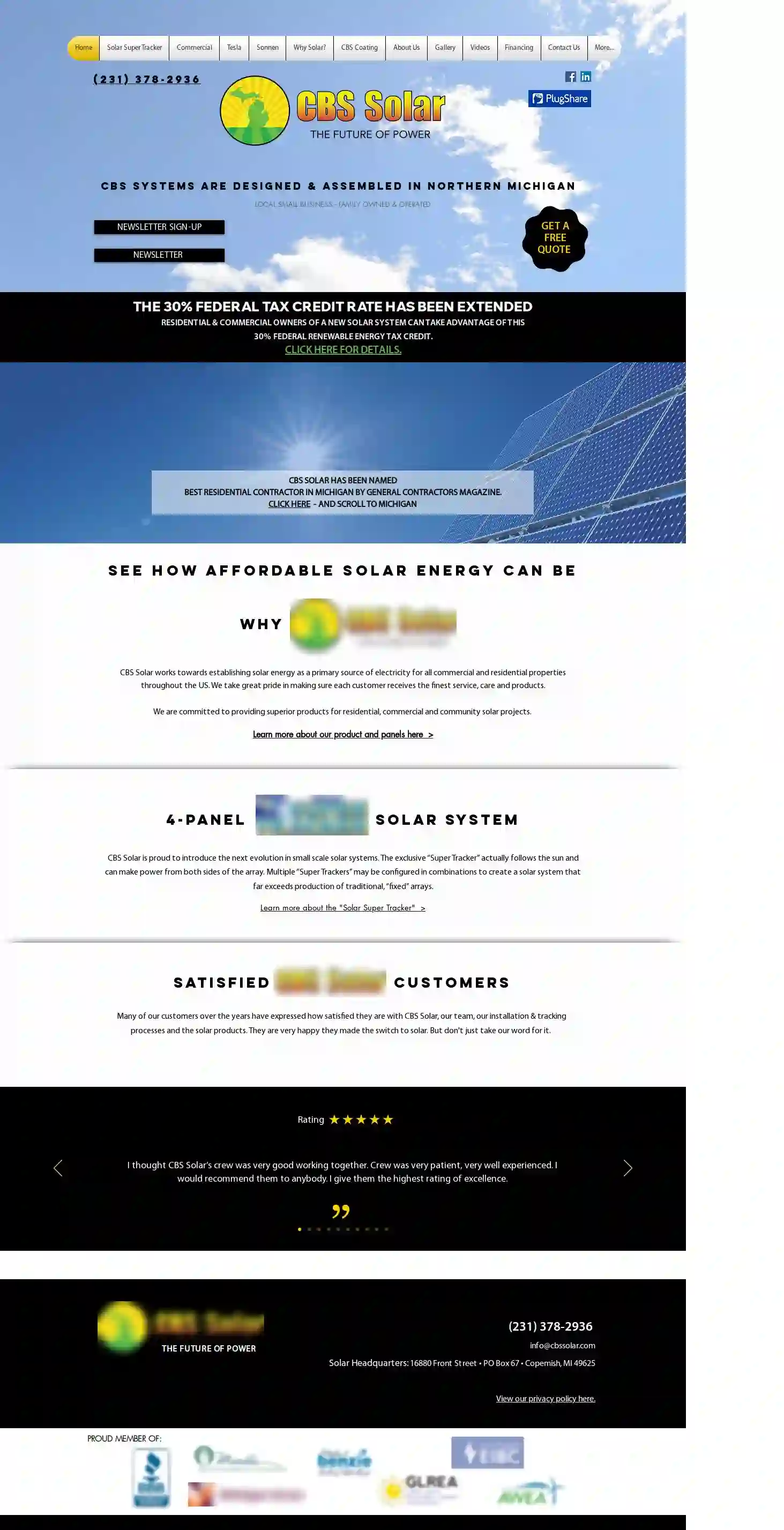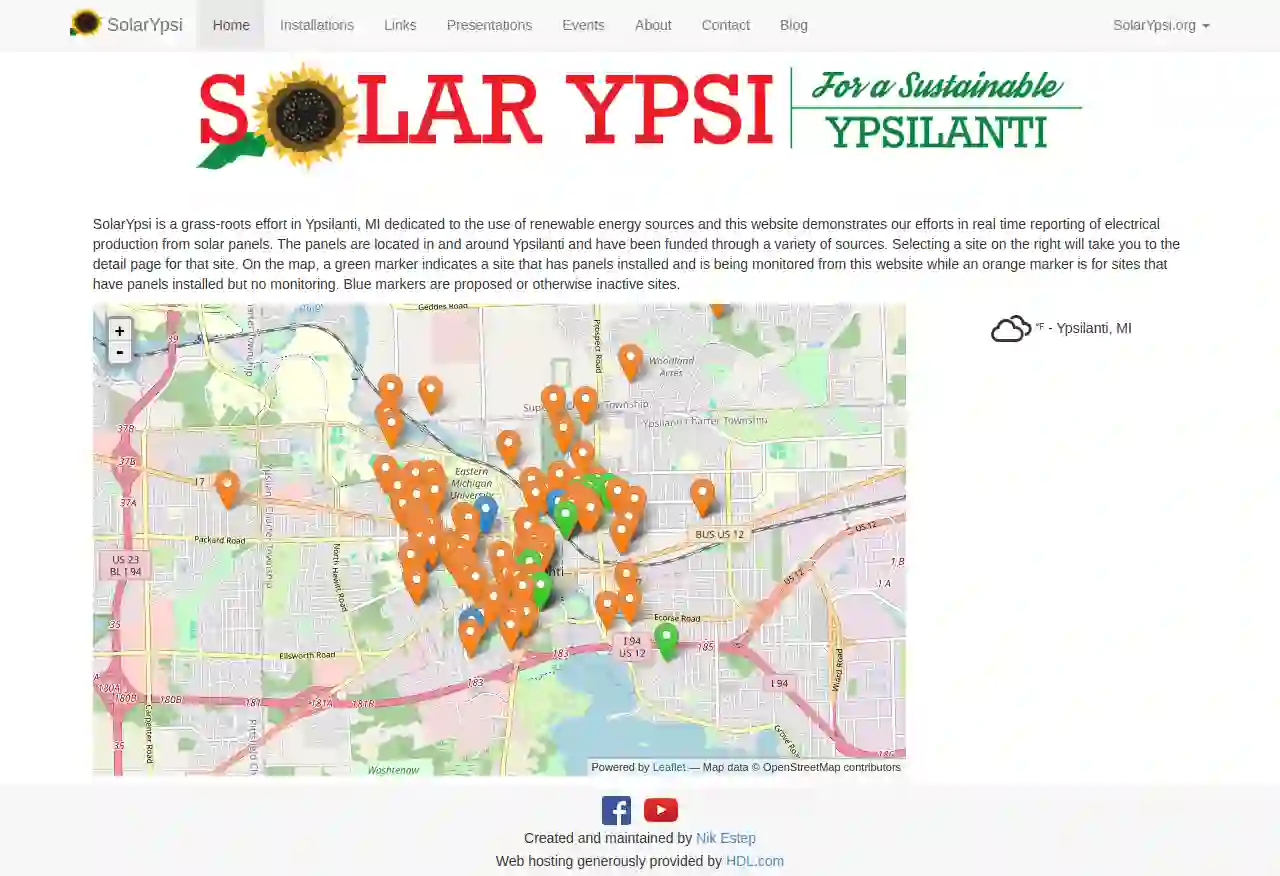Solar Installers Troy
Find Solar Panel Installers in Troy
Get up to 3 Solar Panel Installer quotes for your project today! Compare profiles, reviews, accreditations, portfolio, etc... and choose the best service.

Top Tier Solar Panel Cleaning
56 reviewsNovi, USWelcome to Top Tier Solar Panel Cleaning, a family-owned solar panel cleaning business, where our commitment to excellence shines brighter than the California sun. We know that dirty panels can significantly reduce a solar system's efficiency and effectiveness. That's why we specialize in providing top-quality solar panel cleaning services for both residential and commercial clients throughout the Coachella Valley and surrounding cities. At Top Tier, we take great pride in offering the best service possible, using only the most innovative technology and top-of-the-line products to clean and maintain your solar panels. Our team of skilled technicians provides thorough cleaning, inspection, and maintenance to ensure your solar system is running at its optimal performance. We understand that the cleanliness of your solar panels is not just a convenience but a necessity. That's why we strive to make our services affordable and accessible to all of our clients. We offer a range of customized cleaning options that are designed to suit your specific budget and requirements. At our solar panel cleaning business, we stand out from the competition in many ways. Our experience, combined with our commitment to quality, sets us apart from others in the industry. We also offer outstanding customer service, and our clients appreciate our attention to detail, excellent communication skills and fast response time. We understand that your time is valuable, and we work hard to ensure that we provide a hassle-free service that meets your needs. Our team is dedicated to providing you with the best possible experience, and we'll work with you to create a customized cleaning and maintenance plan that is tailored to your needs. In short, we are your trusted partner when it comes to solar panel cleaning. So, whether you're a homeowner or a business owner, contact us today to learn more about how we can help you keep your solar panels in tip-top shape.
- Services
- Why Us?
- Our Team
- Testimonials
- Gallery
Get Quote
solartonic
3858 Bestech Dr. Ste C, Ypsilanti MI 48197, USA, Ypsilanti, 48197, USsolartonic delivers the highest quality, made in the USA, ecosystem of lighting, security, and wayfinding products that are solar powered with wireless communications for safe public streets and spaces.
- Services
- Why Us?
- Accreditations
- Our Team
- Testimonials
- Gallery
Get Quote
Solis Imperium, Inc.
123 Solar Street, Suite 100, Solar City, 12345, USSolis Imperium, Inc. was created in 2018 to serve the needs of home owners and business professionals alike - and, of course, all those who are looking at means of energy independence . Since then, we have only dedicated ourselves more to continuing the mission of rock-bottom prices with industry best technology, and everything that's resulted is what separates us from everyone else in the Industry. We truly care about you, and put the needs of the customer first. This single minded mission is the culture and atmosphere you find at Solis Imperium, Inc. Here, we truly represent our slogan, Solar Energy, Made Easy! If you would like to find out more about how Solis Imperium, Inc. can serve your needs, get in touch today.
- Services
- Why Us?
- Accreditations
- Our Team
- Testimonials
- Gallery
Get Quote
CBS Solar
4.119 reviewsSolar Headquarters, PO Box 67, 16880 Front Street, Copemish, 49625, USCBS Solar is a family-owned and operated business that has been in operation for over 40 years. They specialize in providing superior solar energy systems for residential, commercial, and community projects. Their commitment to excellence and customer satisfaction has earned them recognition as the Best Residential Contractor in Michigan by General Contractors Magazine. They offer a range of services including solar system installation, tracking, and maintenance, as well as providing information on solar energy benefits and financing options.
- Services
- Why Us?
- Accreditations
- Our Team
- Testimonials
- Gallery
Get Quote
Solar Mounts LLC
511 reviews300 Woolley Dr, Marshall, MI, 49068, USSolar Mounts LLC is a premier one-stop shop for all your commercial and utility scale solar racking needs. Specializing in post-driven ground mounts, ballasted ground mounts, solar carports and ballasted roof mounting systems. Offering solar racking design, manufacturing and mechanical installation of all of our solar mounting systems, as well as others. Contact us today for more information regarding our solar racking and mounting systems.
- Services
- Why Us?
- Accreditations
- Our Team
- Testimonials
- Gallery
Get Quote
North Coast Solar
4.954 reviewsNorth Coast Solar, Davison, MI, 7524 East Atherton Road, 48423, USNorth Coast Solar is a Michigan-based solar installer that offers solar services, generators, and electrical upgrades. They are the only certified solar installer in Michigan to provide both Solar Insure and a Pearl Certification with each installation. Solar Insure provides a 30-year parts and labor warranty on all systems and is backed by Zurich North America. Pearl Certifications ensure that the value of your home will indeed increase with the installation of your solar system and are backed by the Department of Energy and the National Association of Realtors.
- Services
- Why Us?
- Accreditations
- Our Team
- Testimonials
- Gallery
Get Quote
solarypsi
312 North River Street, Ypsilanti, 48198, USSolarYpsi is a grass-roots effort in Ypsilanti, MI dedicated to the use of renewable energy sources and this website demonstrates our efforts in real time reporting of electrical production from solar panels. The panels are located in and around Ypsilanti and have been funded through a variety of sources.
- Services
- Why Us?
- Accreditations
- Our Team
- Testimonials
- Gallery
Get Quote
SunWize Technologies, Inc.
SunWize HQ, Building A, 123 SunWize Drive, SunCity, 12345, USSunWize is a leading provider of power independence solutions, offering a wide range of products and services designed to meet the needs of various industries including oil and gas, telecommunications, transportation, and security. With over 15,000 custom designed systems deployed across all seven continents, SunWize is dedicated to providing high-quality, reliable, and efficient power systems that cater to different applications and environments.
- Services
- Why Us?
- Accreditations
- Our Team
- Testimonials
- Gallery
Get Quote
Solar Central Inc.
58 reviews72056 Northshore St. Ste. B., Thousand Palms, 92276, USWelcome to Solar Central Inc, your local solar energy equipment provider. We are committed to providing high quality installations and market leading equipment to our customers. Our team of experts will work with you to customize the perfect solar solution for your home or business. We also provide educational resources to help you understand the benefits of solar energy and how it can work for you.
- Services
- Why Us?
- Accreditations
- Gallery
Get Quote
Harness Solar Power California
N/A, USHarness Power California is a solar energy company that has been serving California for the last 5 years. They represent top solar brands including Sunpower, Tesla, REC, Generac, Enphase, and SunRun. They offer various promotions and programs for homeowners and businesses, aiming to provide great savings and cleaner power.
- Services
- Why Us?
- Accreditations
- Our Team
- Gallery
Get Quote
Over 4,210+ Solar Installers onboarded
Our solar companies operate in Troy & beyond!
SolarCompaniesHub has curated and vetted Top Solar Installers arround Troy. Find a top & trustworthy business today.
Frequently Asked Questions About Solar Installers
- Analyze your energy bills
- Assess your roof's suitability
- Calculate your potential solar energy generation
- Recommend a system size that meets your needs and goals.
- Adequate Sunlight: Unobstructed sunlight for a significant portion of the day.
- Sufficient Space: Enough space to accommodate the desired number of panels.
- Structural Integrity: A strong roof structure capable of supporting the weight of the panels.
- Appropriate Orientation and Tilt: Ideally, the roof should face south (in the Northern Hemisphere) or north (in the Southern Hemisphere) with a tilt angle close to the latitude of your location. However, other orientations and tilts can still be effective.
- Use a Directory Like SolarCompaniesHub: We connect you with pre-screened, qualified solar installers in your area.
- Check Online Reviews: Look for positive reviews on Google, Yelp, and other reputable sources.
- Ask for Referrals: Get recommendations from friends, family, or neighbors who have gone solar.
- Verify Credentials: Ensure the installer is licensed, insured, and certified by reputable organizations (e.g., NABCEP in the US).
- Get Multiple Quotes: Compare quotes from at least 3-4 installers to find the best value for your project.
- Ask Questions: Don't hesitate to ask installers about their experience, warranties, and the process they follow.
How do I choose the right solar panel system size for my needs?
How do I know if my roof is suitable for solar panels?
What is the lifespan of solar panels?
How do I find a good solar installer near me?
How do I choose the right solar panel system size for my needs?
- Analyze your energy bills
- Assess your roof's suitability
- Calculate your potential solar energy generation
- Recommend a system size that meets your needs and goals.
How do I know if my roof is suitable for solar panels?
- Adequate Sunlight: Unobstructed sunlight for a significant portion of the day.
- Sufficient Space: Enough space to accommodate the desired number of panels.
- Structural Integrity: A strong roof structure capable of supporting the weight of the panels.
- Appropriate Orientation and Tilt: Ideally, the roof should face south (in the Northern Hemisphere) or north (in the Southern Hemisphere) with a tilt angle close to the latitude of your location. However, other orientations and tilts can still be effective.
What is the lifespan of solar panels?
How do I find a good solar installer near me?
- Use a Directory Like SolarCompaniesHub: We connect you with pre-screened, qualified solar installers in your area.
- Check Online Reviews: Look for positive reviews on Google, Yelp, and other reputable sources.
- Ask for Referrals: Get recommendations from friends, family, or neighbors who have gone solar.
- Verify Credentials: Ensure the installer is licensed, insured, and certified by reputable organizations (e.g., NABCEP in the US).
- Get Multiple Quotes: Compare quotes from at least 3-4 installers to find the best value for your project.
- Ask Questions: Don't hesitate to ask installers about their experience, warranties, and the process they follow.